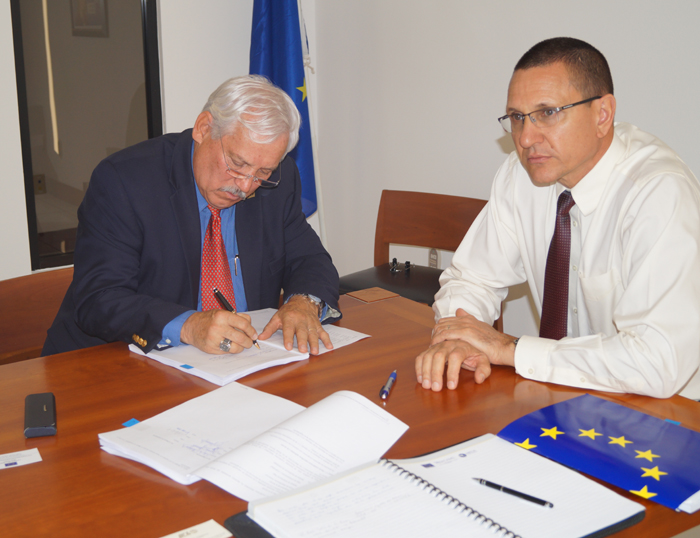IICA launches program to combat coffee leaf rust in Central America and the Dominican Republic

San José, 10 February 2016 (IICA). Between 2012 and 2013, 2.7 million bags of coffee were completely lost to coffee leaf rust in Central America and the Dominican Republic, representing 20% of the total coffee production. The situation had a significant socio-economic impact on the region.
Through the implementation of the Central American Program for Comprehensive Management of Coffee Leaf Rust, with financial support from the European Union, the Inter-American Institute for Cooperation on Agriculture (IICA) is seeking to prevent similar situations from occurring in the future.
The project agreement was signed on January 27 in Nicaragua by Víctor M. Villalobos, Director General of IICA, and Laurent Sillano, Head of Cooperation of the European Union Delegation in Nicaragua.
The program was launched on February 1 and will be carried out over the next five years. Its areas of intervention will be Central America and the Dominican Republic at the regional level; Guatemala, El Salvador, Honduras and Nicaragua at the national level; and five specific regions in those four countries at the local level.
The initiative seeks to assist the coffee production sector in adopting and implementing climate change adaptation, mitigation and risk management strategies; to develop an early warning system; to design and establish regional policies; to strengthen institutional frameworks; and to generate employment opportunities that will contribute to rural well-being.
It is estimated that the Central American Program for Comprehensive Management of Coffee Leaf Rust will benefit 330 thousand coffee-growing families.
The Tropical Agriculture Research and Higher Education Center (CATIE), the Agricultural Research Center for International Development (CIRAD), the Executive Secretariat of the Central American Agricultural Council (SECAC), the German Agency for International Cooperation (GIZ), and the Regional Cooperative Program for the Technological Development and Modernization of Coffee Production (PROMECAFE) are some of the key partners that will be assisting IICA throughout the program’s execution. These institutions will focus their efforts on consolidating the objectives of this initiative and, ultimately, on helping the most vulnerable populations in the areas of intervention, which depend on coffee production, to improve their ability to respond to natural disasters.
More information: